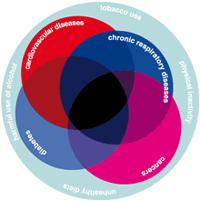 Prevention and control of NCDs is essential for health and developmentUnder the auspices of the Custodian of the two Holy Mosques, King Abdullah bin Abdulaziz Al Saud, the Ministry of Health of Saudi Arabia, in collaboration with the WHO Regional Office for the Eastern Mediterranean, is organizing an International Conference on Healthy Lifestyles and Non-communicable Diseases (NCDs) in the Arab World and the Middle East.
Prevention and control of NCDs is essential for health and developmentUnder the auspices of the Custodian of the two Holy Mosques, King Abdullah bin Abdulaziz Al Saud, the Ministry of Health of Saudi Arabia, in collaboration with the WHO Regional Office for the Eastern Mediterranean, is organizing an International Conference on Healthy Lifestyles and Non-communicable Diseases (NCDs) in the Arab World and the Middle East.
The conference will be held in King Fahd Cultural Centre in Riyadh from 9 to 12 September 2012. The conference aims to create momentum for the implementation of the United Nations General Assembly Political Declaration on Prevention and Control of Non-communicable Diseases at the regional level. It is expected that a “Riyadh Declaration” will be adopted at the end of the Conference, to reiterate participants’ commitment, and that of the parties they represent, to making the United Nations General Assembly Political Declaration on Control and Prevention of Non-communicable Diseases a success story across the Region.
“The call to hold this conference goes in line with the health, social and economic developments that the Eastern Mediterranean Region has witnessed over the past decades”, said Dr Ala Alwan, WHO Regional Director for the Eastern Mediterranean.
By hosting this important conference and providing full sponsorship to make it happen, Saudi Arabia adds significantly to its contribution to health improvement in the Region”, Dr Alwan added.
Tracing the developments of life expectancy in the region over the past decades can help understand the growing trends in NCD incidence and mortality which have been experienced in the past decades in the Region. Life expectancy in the WHO Eastern Mediterranean Region has increased from 51 years in 1970 to almost 70 today, the greatest gain of any region in the world. It is estimated that more than 2.2 million people died from NCDs in the Region in 2008 – mainly from cardiovascular diseases, cancers, chronic respiratory diseases and diabetes. This figure accounts, on average, for 53% of all deaths, but in some countries may reach more than 80%.


